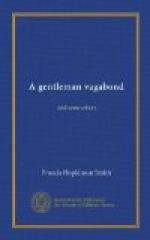The “boys” referred to were members of a certain “Ducking Club” situated within rifle-shot of the major’s house on the island, of which club Jack Hardy was president. They all delighted in the major’s society, really loving him for many qualities known only to his intimates.
Hardy, I knew, was not at home. This, however, never prevented his colored servant, Jefferson, from being always ready at a moment’s notice to welcome the unexpected friend. In another instant I had rung Hardy’s bell,—third on right,—and Jefferson, in faultless evening attire, was carrying the major’s “carpet-bag” to the suite of apartments on the third floor front.
Jefferson needs a word of comment. Although born and bred a slave, he is the product of a newer and higher civilization. There is hardly a trace of the old South left in him,—hardly a mark of the pit of slavery from which he was digged. His speech is as faultless as his dress. He is clean, close-shaven, immaculate, well-groomed, silent,—reminding me always of a mahogany-colored Greek professor, even to his eye-glasses. He keeps his rooms in admirable order, and his household accounts with absolute accuracy; never spilled a drop of claret, mixed a warm cocktail, or served a cold plate in his life; is devoted to Hardy, and so punctiliously polite to his master’s friends and guests that it is a pleasure to have him serve you.
Strange to say, this punctilious politeness had never extended to the major, and since an occurrence connected with this very bag, to be related shortly, it had ceased altogether. Whether it was that Jefferson had always seen through the peculiar varnish that made bright the major’s veneer, or whether in an unguarded moment, on a previous visit, the major gave way to some such outburst as he would have inflicted upon the domestics of his own establishment, forgetting for the time the superior position to which Jefferson’s breeding and education entitled him, I cannot say, but certain it is that while to all outward appearances Jefferson served the major with every indication of attention and humility, I could see under it all a quiet reserve which marked the line of unqualified disapproval. This was evident even in the way he carried the major’s bag,—holding it out by the straps, not as became the handling of a receptacle containing a gentleman’s wardrobe, but by the neck, so to speak,—as a dog to be dropped in the gutter.
It was this bag, or rather its contents, or to be more exact its lack of contents, that dulled the fine edge of Jefferson’s politeness. He unpacked it, of course, with the same perfunctory care that he would have bestowed on the contents of a Bond Street Gladstone, indulging in a prolonged chuckle when he found no trace of a most important part of a gentleman’s wardrobe,—none of any pattern. It was, therefore, with a certain grim humor that, when he showed the major to his room the night of his arrival, he led gradually up to a question which the unpacking a few hours before had rendered inevitable.




